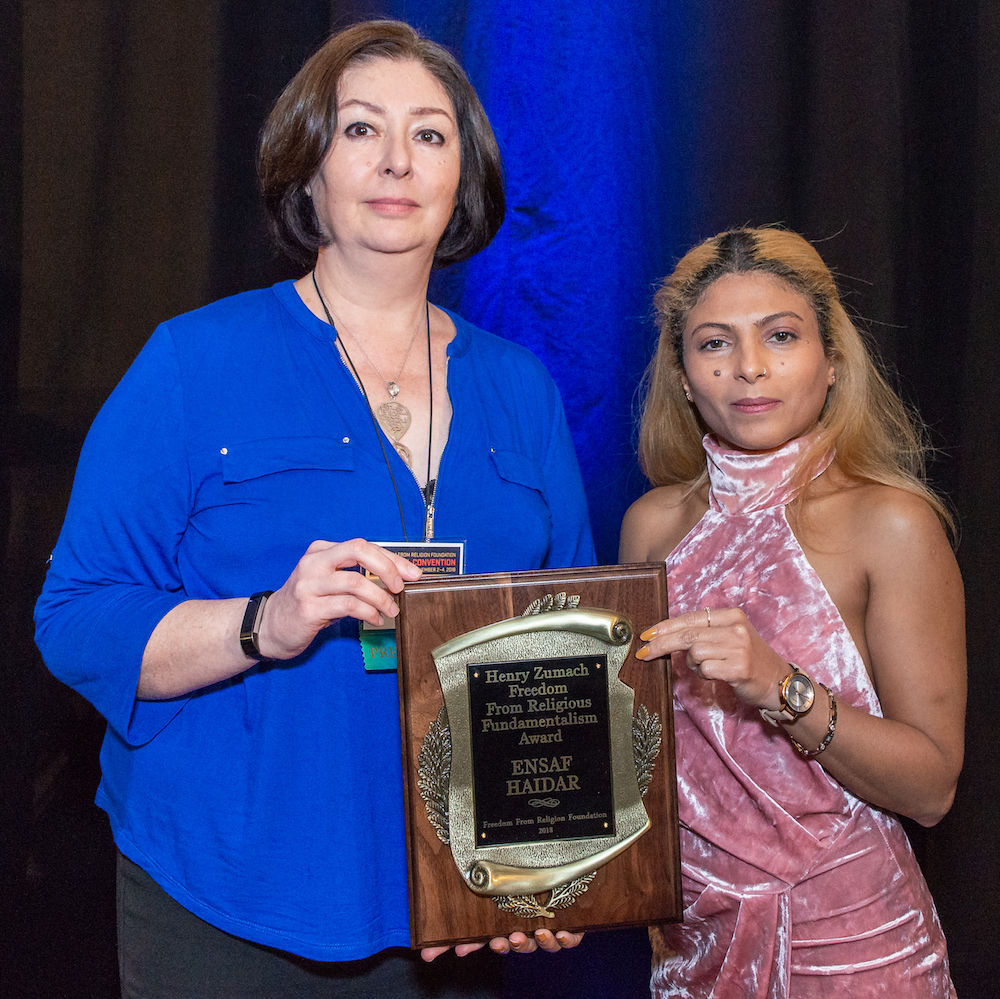
Ensaf Haidar: To gain freedom, we must not remain silent
Maryam Namazie, left, gives a kiss to Ensaf Haidar after presenting her with the Henry Zumach Freedom From Religious Fundamentalism Award. (Photo by Ingrid Laas)
This is an edited version of the speech given by Ensaf Haidar on Nov. 3 at FFRF’s national convention in San Francisco. Haidar was the recipient of the 2018 Henry Zumach Freedom From Religious Fundamendalism Award, which includes a plaque and $10,000.
Mohammed Al Khadra, who spoke earlier that day at the convention, served as interpreter for Haidar’s remarks, which were delivered in Arabic.
Haidar was introduced by Maryam Namazie, an Iranian-born writer and activist who was last year’s recipient of the prestigious award:
Ensaf Haidar was born in 1975 in Jizan, Saudi Arabia. Against the will of her family, she married Raif Badawi in 2002. Raif, initially arrested on charges of apostasy, which carries an automatic death sentence, was convicted in July 2013 for founding an internet forum that “violates Islamic values and propagates liberal thought,” and sentenced to 600 lashes and seven years in prison, then resentenced in May 2014 to 1,000 lashes and 10 years in prison, with a major fine added. His attorney was then sentenced to five years imprisonment. Ensaf and their three children escaped from Saudi Arabia and were finally granted asylum in Canada. In January 2015, Raif was flogged 50 times before hundreds of spectators, creating an international outcry. Ensaf has been desperately fighting to free her husband and raise awareness of Raif’s story across the world. She is the president and co-founder of the Raif Badawi Foundation for Freedom.
By Ensaf Haidar
My husband Raif Badawi has been behind the cold steel bars of the cells of Saudi Arabia for more than six years. Six years, we’ve never grown tired of having hope every single day. Six years of perpetual waiting.
Six years of painful questions, such as when my children ask me: When does Daddy come back? Or when they ask: Mom, I read that only criminals go to jail. Is Dad a criminal?
For heaven’s sake, what shall my answers be?
I carry to you the message of my husband and my three children, children who were denied to have their father in their life because he exercised his right of free expression.
I carry to you a message of hope that I will one day see Raif standing here in front of you so that he would tell you about freedom and human rights. So that he can tell you that freedom cannot be imprisoned, lashed or given a death penalty, no matter how much they try and how far they can go in their oppression and humiliation.
Yes, I have talked about Raif much and I still do. I described his suffering in many places and occasions, and this has always been possible because of people like you. Now, it has been six years and the future is still unknown.
The hands of the clock stand still at my house. Part of us is in jail and our pain grows every day. But we haven’t yet lost hope and this is because of all of you. Your solidarity is the true assistance and recognition and your advocacy for freethinkers in the Arabic and Muslim world provides us with more support.
If Western governments are genuinely interested in combating Islamic terrorism, then the first thing to be done should be to aid the anti-radical voices within the Islamic world, and all those who defend universal human rights.
It is determination that brought me from Québec, Canada, to stand before you and say, with a loud voice and fixed feet, that peaceful change is possible in all authoritarian states with this new generation — a generation of globalization, the internet and blogging. Ideas cannot be censored anymore.
It’s a new change, a new revolution from Morocco to Jakarta. This young generation is going to determine the nature of the future and we must aid them and stand next to them and this is where you fit into this change.
The real prisoners are those who are capable of defending freedom and choose not to.
I have talked a great deal and I don’t think there is anything you do not know about our case, but I would like tell you in short that Raif’s case is not an individual issue, it’s a societal issue, an issue of a country and a homeland.
Raif Badawi carried his concerns for the nation in his heart, he expressed his ideas with his pen, his words with ink.
Change will not be possible if we let fear censor us. It will not be possible if silence continues to be our approach.
There will be a day when they will need to follow the international laws and treaties of human rights. This dream will become a reality. I have trust in that, and I have trust that Raif will stand before you one day and then I will rightfully be delighted. The day of his release will be a great day for freedom and its supporters worldwide.
Thank you for being here and honoring me with this prize here in San Francisco, a city of freedom.

